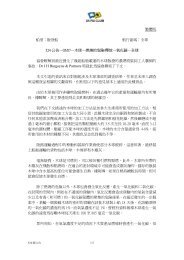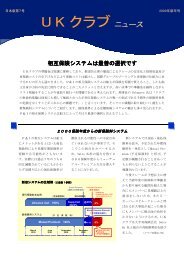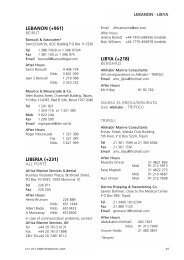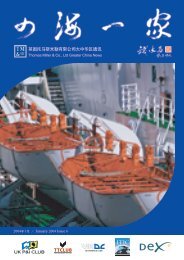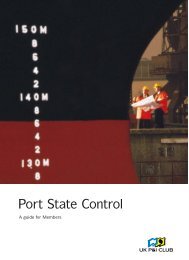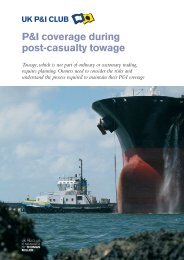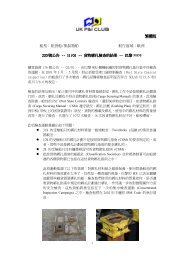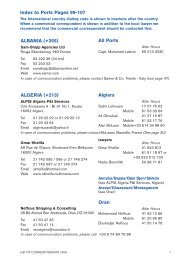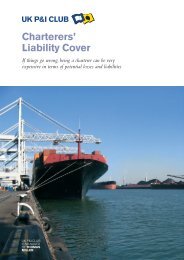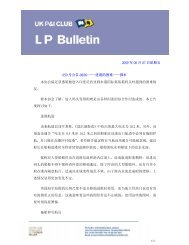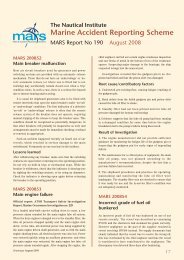You also want an ePaper? Increase the reach of your titles
YUMPU automatically turns print PDFs into web optimized ePapers that Google loves.
isps summaryISPS and legalimplicationsWith the entry into force of the ISPSCode, we summarise below some of thekey requirements and legal implications.■ SOLAS was amended in December2002 to include a new Chapter XI-2addressing ship security.■ In addition, the International Ship andPort Facility Security (ISPS) Code wasadopted.■ The ISPS Code came into force on1 July 2004.Interested parties■ Passenger ships, including high-speedpassenger craft;■ Cargo ships, including high-speed craft,of 500 gross tonnage and upwards;■ Mobile offshore drilling units;■ Shore facilities serving such shipsengaged on international voyages.Summary of requirementsA Ship modificationsAs of 1 July 2004 vessels are required to:■ Fit and carry an automaticidentification system;■ Show the ship identification numberinternally and externally;■ Have a compliant ship security alertsystem.B Documentary / informationrequirements for shipsVessels are required to:■ Carry a ship security plan which hasbeen approved by, or on the behalf of,the flag state;■ Obtain and carry an international shipsecurity certificate <strong>issue</strong>d or authorisedby the flag state;■ Carry a continuous synopsis record<strong>issue</strong>d by the flag state;■ Carry additional information onboardrelating to parties responsible for crewappointees, parties to charterparties,and those responsible for deciding theemployment of the ship;■ Have available onboard a record ofcertain other security relatedinformation eg: the ship’s level ofsecurity in at least the last ten previousports.C Shipping company responsibilitiesAs of 1 July 2004 shipping companies arerequired to obtain an international shipsecurity certificate in respect of each shipthat they operate. In order to do so thecompany must:■ Appoint a company security officer whoshould have knowledge and training inthe relevant security matters;■ Carry out a ship security assessment;■ Designate an officer on each ship asthe ship security officer;■ Produce a ship security plan, ensuringthat the plan is approved by or on behalfof the flag state, available onboard thevessel at all times and that the measuresoutlined in the plan are implemented.■ Ensure that appropriate security drillsand exercises are carried out;■ Provide appropriate resources to theship to carry out the security plan.ISPS in practiceAs of 1 July 2004, Regulation 9 of XI-2establishes that a contractinggovernment, will have the right toexercise various control and compliancemeasures, including:■ Port state control inspection to verifythat a valid international ship securitycertificate (or interim certificate) isheld onboard;■ Inspection of the ship’s security planwith limited access allowed to specificsections of the plan relating to the noncompliance,subject to the consent ofeither the flag state or the master;■ If there are ‘clear grounds’ then theport can impose ‘additional controlmeasures’.Clear groundsThese may include evidence or reliableinformation that:■ The vessel does not correspond withthe requirements;■ Documentation is not valid or hasexpired;■ The master or ship’s personnel are notfamiliar with the security procedures;■ The vessel has embarked persons, orloaded stores in violation of the ISPSCode;■ The vessel has not completed adeclaration of security.Additional control measuresThese may include:■ A more extensive inspection of the ship;■ Delaying or deviating the ship;■ Detention of the ship;■ Restriction of operations within theport;■ Refusal of port entry/expulsion of thevessel from the port.Denied entry/expulsion■ When this occurs, the port state shouldcontinued over23



